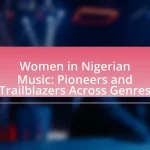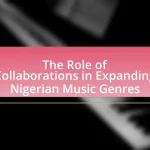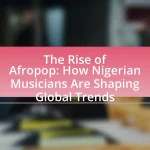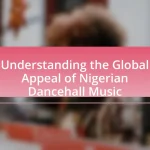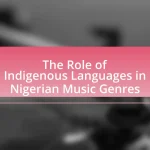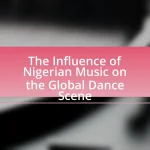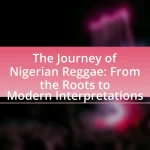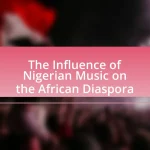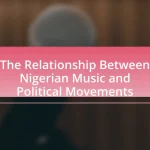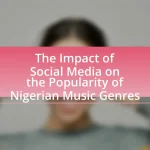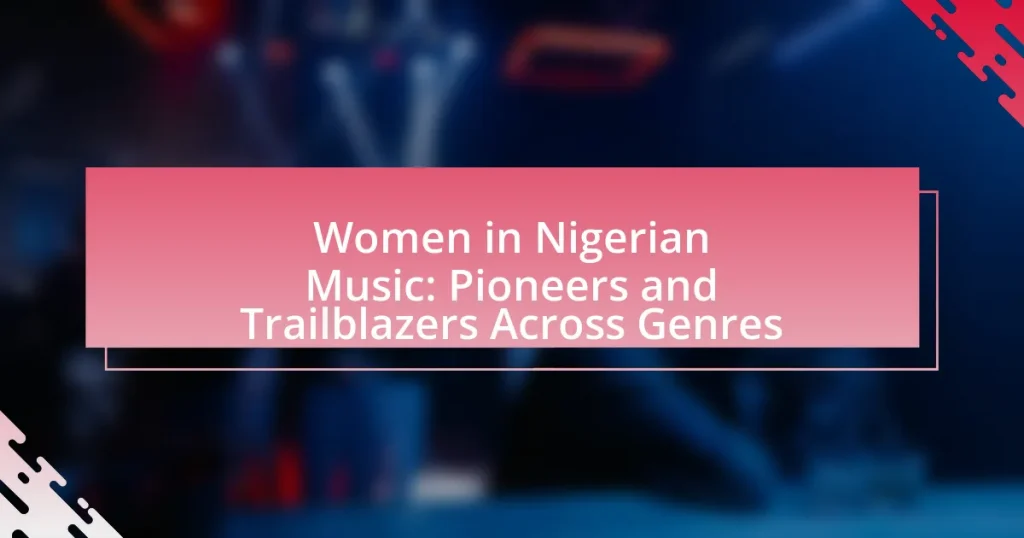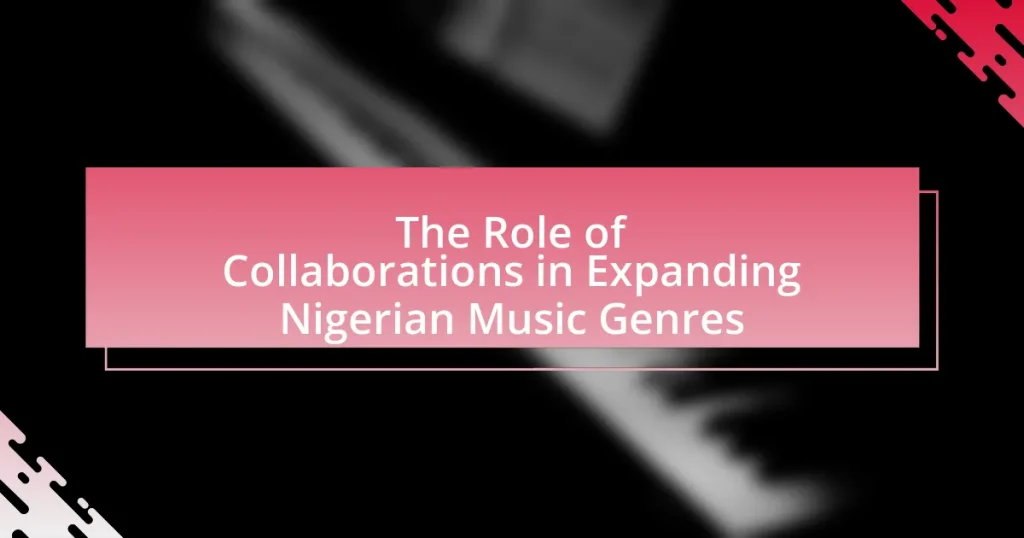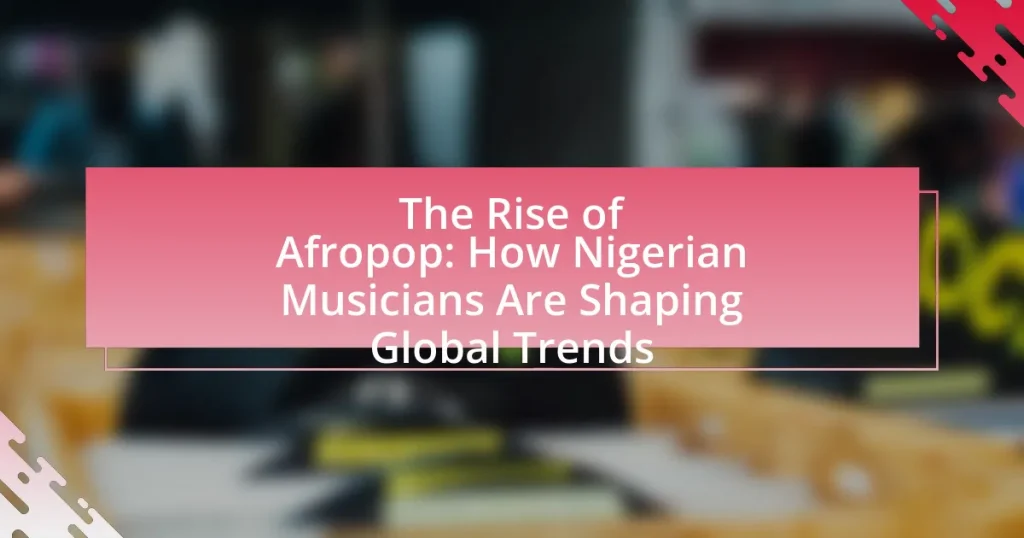Nigerian music festivals are significant cultural events that celebrate a wide range of musical genres, including Afrobeats, hip-hop, highlife, and traditional music. These festivals, such as the Lagos Jazz Series and the Calabar Carnival, promote cultural diversity, boost local economies, and provide platforms for both local and international artists. They play a crucial role in enhancing Nigeria’s global cultural presence while fostering community engagement and unity. The article explores how these festivals reflect Nigeria’s rich musical heritage, the economic impacts on local communities, and the evolving trends in the festival scene, including the integration of technology and diverse genres.
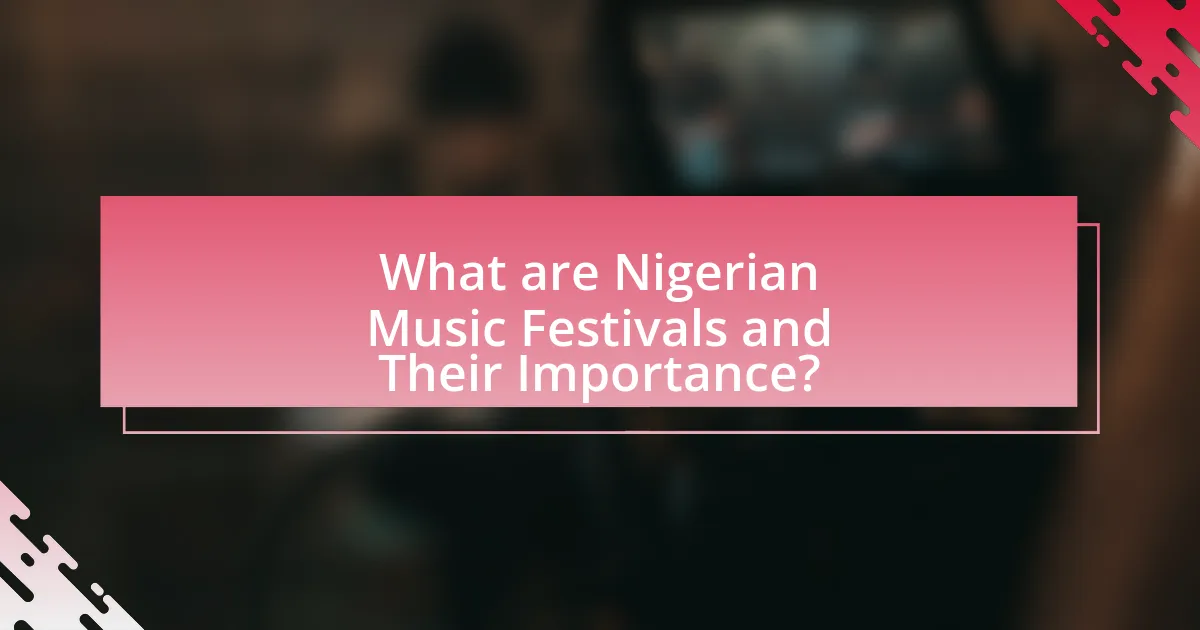
What are Nigerian Music Festivals and Their Importance?
Nigerian music festivals are large-scale events that celebrate various genres of music, showcasing both local and international artists. These festivals play a crucial role in promoting cultural exchange, boosting tourism, and providing a platform for emerging talents. For instance, events like the Lagos Jazz Series and the Calabar Carnival attract thousands of attendees, significantly contributing to the local economy and enhancing Nigeria’s global cultural presence. Additionally, these festivals foster community engagement and unity through shared musical experiences, highlighting the rich diversity of Nigeria’s music scene.
How do Nigerian music festivals reflect cultural diversity?
Nigerian music festivals reflect cultural diversity by showcasing a wide array of musical genres that represent the country’s various ethnic groups and traditions. These festivals, such as the Lagos Jazz Series and the Calabar Carnival, feature performances from artists across different regions, highlighting styles like Afrobeats, Highlife, Juju, and traditional folk music. For instance, the inclusion of artists from the Yoruba, Igbo, and Hausa cultures demonstrates the rich tapestry of Nigeria’s cultural heritage. Additionally, the festivals often incorporate traditional instruments and dance forms, further emphasizing the blend of contemporary and indigenous influences. This celebration of diverse musical expressions not only entertains but also fosters unity and appreciation among Nigeria’s multifaceted communities.
What genres are commonly showcased at these festivals?
Nigerian music festivals commonly showcase genres such as Afrobeats, hip-hop, highlife, reggae, and traditional music. These genres reflect the rich cultural diversity of Nigeria and attract a wide audience. For instance, Afrobeats has gained international recognition, with artists like Burna Boy and Wizkid leading the charge, while hip-hop continues to evolve with local influences. Highlife, rooted in the country’s history, remains popular, and reggae often features prominently due to its cultural resonance. Traditional music also plays a vital role, highlighting Nigeria’s heritage and connecting audiences to their roots.
How do festivals promote local and international artists?
Festivals promote local and international artists by providing a platform for exposure and networking opportunities. These events attract diverse audiences, allowing artists to showcase their work to potential fans, industry professionals, and media. For instance, Nigerian music festivals like the Lagos Jazz Series and the Calabar Carnival feature both local talents and international acts, enhancing cultural exchange and collaboration. This exposure can lead to increased visibility, bookings, and collaborations, as evidenced by the rise in international collaborations among Nigerian artists following their performances at such festivals.
Why are music festivals significant for the Nigerian music industry?
Music festivals are significant for the Nigerian music industry because they serve as platforms for showcasing diverse genres and emerging talent. These festivals, such as the Lagos Jazz Series and the Afrobeats Festival, attract both local and international audiences, thereby enhancing the visibility of Nigerian artists. Additionally, they stimulate economic growth by generating revenue through ticket sales, tourism, and sponsorships. According to a report by the Nigerian Bureau of Statistics, the entertainment sector, including music festivals, contributed approximately 2.3% to Nigeria’s GDP in 2020, highlighting their economic impact. Furthermore, music festivals foster collaboration among artists, producers, and industry stakeholders, promoting innovation and cultural exchange within the Nigerian music landscape.
What economic impacts do these festivals have on local communities?
Nigerian music festivals significantly boost local economies by increasing tourism, creating jobs, and generating revenue for local businesses. These festivals attract thousands of attendees, leading to heightened demand for accommodations, food, and transportation services. For instance, the 2022 Lagos Jazz Series reportedly generated over $1 million in revenue, benefiting hotels, restaurants, and local vendors. Additionally, the festivals provide employment opportunities for local artists, event staff, and service providers, further stimulating economic growth within the community.
How do festivals contribute to the global recognition of Nigerian music?
Festivals significantly enhance the global recognition of Nigerian music by providing a platform for artists to showcase their talents to international audiences. Events like the Lagos Jazz Series and the Calabar Carnival attract global media attention and music enthusiasts, facilitating cultural exchange and collaboration. For instance, the 2022 Lagos Jazz Festival featured renowned international artists alongside local talents, resulting in increased visibility for Nigerian genres such as Afrobeats and Highlife. This exposure not only promotes Nigerian music but also fosters partnerships with global music markets, thereby solidifying Nigeria’s position in the international music scene.
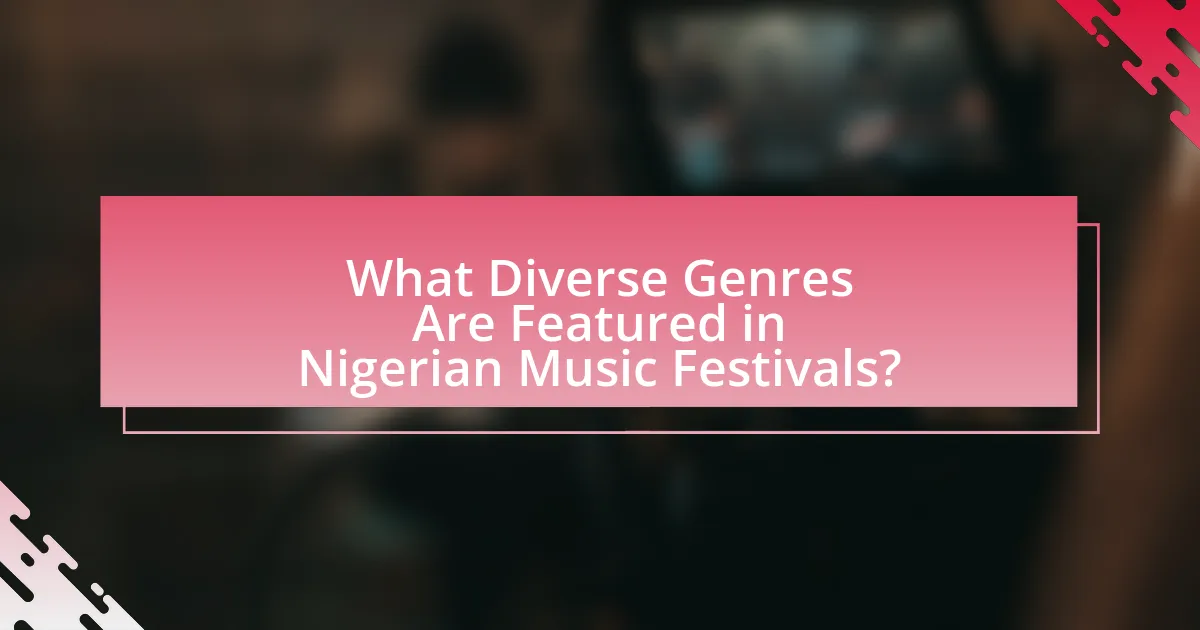
What Diverse Genres Are Featured in Nigerian Music Festivals?
Nigerian music festivals feature a wide array of genres, including Afrobeats, hip-hop, highlife, juju, gospel, and traditional music. These festivals serve as platforms for both established and emerging artists, showcasing the rich musical diversity of Nigeria. For instance, the annual Lagos Jazz Series highlights jazz alongside contemporary genres, while the Calabar Carnival emphasizes traditional music and dance. This variety reflects Nigeria’s cultural heritage and the evolving music scene, attracting diverse audiences and promoting cross-genre collaborations.
How does Afrobeats dominate the festival scene?
Afrobeats dominates the festival scene by attracting large audiences and featuring prominent artists, which enhances its visibility and cultural impact. Major festivals like Afro Nation and the Lagos Jazz Festival prominently showcase Afrobeats, drawing thousands of attendees and international media attention. The genre’s infectious rhythms and danceable beats resonate with diverse audiences, leading to sold-out events and increased ticket sales. Additionally, collaborations between Afrobeats artists and global stars, such as Beyoncé and Drake, further elevate the genre’s profile at festivals, solidifying its status as a leading force in the music industry.
What are the origins and influences of Afrobeats?
Afrobeats originated in Nigeria in the early 2000s, blending traditional African music with elements of hip-hop, dancehall, and highlife. This genre draws significant influence from various musical styles, including American R&B, reggae, and soca, which have shaped its rhythmic and melodic structures. The rise of digital platforms and social media has facilitated the global spread of Afrobeats, allowing artists like Wizkid and Burna Boy to reach international audiences, further solidifying its impact on contemporary music.
How has Afrobeats evolved over the years?
Afrobeats has evolved significantly over the years, transitioning from a localized genre to a global phenomenon. Initially rooted in West African highlife and traditional rhythms, Afrobeats began gaining international attention in the early 2000s, particularly with artists like D’banj and P-Square, who incorporated contemporary elements such as hip-hop and R&B. The genre’s evolution continued with the rise of artists like Wizkid and Burna Boy, who have successfully blended Afrobeats with global music styles, leading to collaborations with international stars and performances at major music festivals worldwide. This expansion is evidenced by Burna Boy’s Grammy win in 2020 for Best World Music Album, highlighting the genre’s growing influence and acceptance on the global stage.
What role do traditional genres play in these festivals?
Traditional genres play a crucial role in Nigerian music festivals by preserving cultural heritage and fostering community identity. These genres, such as Highlife, Juju, and Afrobeat, serve as a medium for storytelling and cultural expression, allowing artists to connect with audiences on a deeper level. For instance, the inclusion of traditional music in festivals like the Lagos Jazz Series and the Calabar Carnival highlights the importance of these genres in celebrating Nigeria’s rich musical history and diversity. This integration not only attracts a wide range of attendees but also educates younger generations about their cultural roots, ensuring the continuity of these traditional forms.
How are indigenous sounds integrated into modern performances?
Indigenous sounds are integrated into modern performances through the incorporation of traditional instruments, rhythms, and vocal techniques that reflect cultural heritage. For instance, Nigerian music festivals often feature artists who blend indigenous sounds with contemporary genres like hip-hop and pop, using instruments such as the talking drum and shekere to create a fusion that resonates with both local and global audiences. This integration not only preserves cultural identity but also enhances the richness of modern music, as seen in the works of artists like Burna Boy and Wizkid, who frequently draw on traditional melodies and themes in their songs.
What are some examples of traditional genres showcased?
Some examples of traditional genres showcased at Nigerian music festivals include Highlife, Juju, and Afrobeat. Highlife originated in Ghana and incorporates jazz influences, while Juju music blends traditional Yoruba rhythms with modern instruments. Afrobeat, popularized by Fela Kuti, combines traditional African music with jazz, funk, and highlife elements. These genres reflect Nigeria’s rich cultural heritage and are often featured prominently in festival lineups, attracting both local and international audiences.
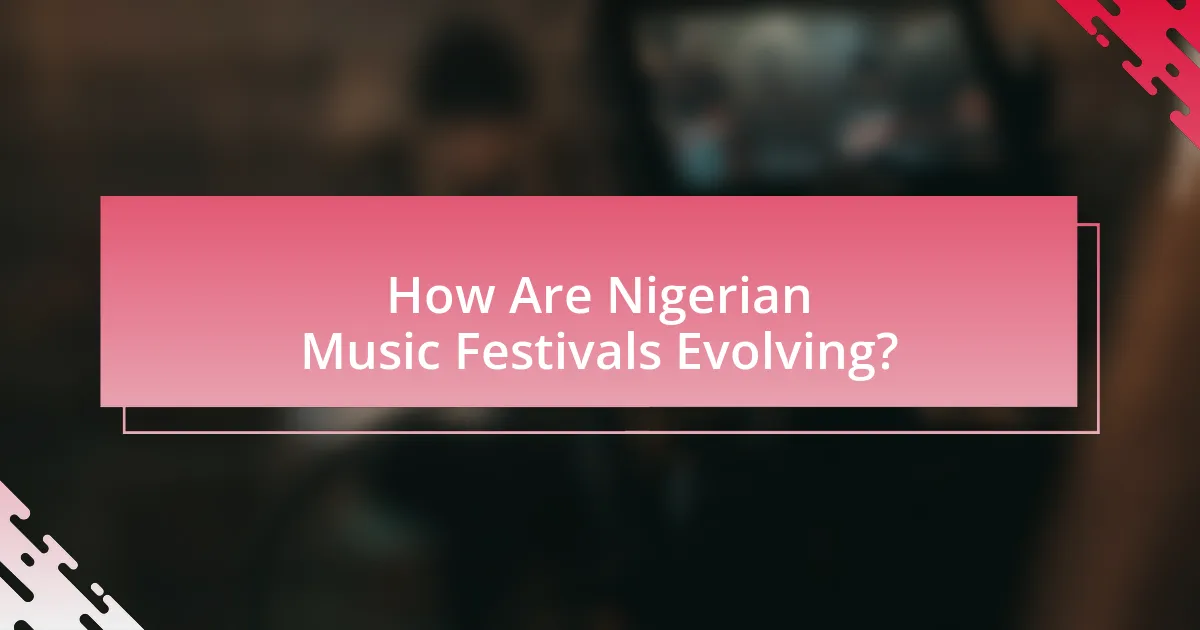
How Are Nigerian Music Festivals Evolving?
Nigerian music festivals are evolving by increasingly showcasing a wider array of genres, reflecting the country’s rich musical diversity. This evolution is evident in festivals like the Lagos Jazz Series and the Afrobeats Festival, which now feature not only traditional genres like Highlife and Juju but also contemporary styles such as Afrobeats, Hip-Hop, and R&B. The inclusion of international artists and collaborations has further broadened the appeal and reach of these festivals, attracting a global audience. According to a report by the Nigerian Entertainment Industry, the growth of music festivals has contributed significantly to the local economy, with attendance numbers rising by over 30% in recent years, indicating a growing interest in diverse musical experiences.
What trends are emerging in the festival scene?
Emerging trends in the festival scene include the increasing incorporation of diverse musical genres, a focus on sustainability, and the integration of technology. Nigerian music festivals are showcasing a variety of genres such as Afrobeats, hip-hop, and traditional music, reflecting the country’s rich cultural tapestry. Additionally, many festivals are adopting eco-friendly practices, such as waste reduction and renewable energy use, to address environmental concerns. The use of technology, including live streaming and interactive apps, enhances audience engagement and expands reach, allowing global participation. These trends indicate a dynamic evolution in the festival landscape, driven by cultural diversity and modern innovations.
How are technology and social media influencing festival experiences?
Technology and social media are significantly enhancing festival experiences by facilitating real-time engagement and broadening audience reach. For instance, live streaming allows fans unable to attend in person to experience performances virtually, which was notably utilized during the COVID-19 pandemic when many festivals transitioned online. Additionally, social media platforms enable attendees to share their experiences instantly, creating a sense of community and increasing visibility for artists and events. According to a report by Eventbrite, 80% of festival-goers use social media to discover events, highlighting its role in shaping attendance and engagement. Furthermore, technology such as mobile apps enhances the festival experience by providing schedules, maps, and interactive features, making it easier for attendees to navigate and enjoy the event.
What new genres are gaining popularity at these events?
New genres gaining popularity at Nigerian music festivals include Afrobeats fusion, alternative R&B, and indigenous hip-hop. These genres are increasingly featured in lineups, reflecting the evolving musical landscape in Nigeria. For instance, Afrobeats fusion combines traditional African rhythms with global music styles, attracting a diverse audience and gaining international recognition. Alternative R&B, characterized by its unique sound and lyrical depth, resonates with younger audiences seeking authenticity. Indigenous hip-hop showcases local dialects and cultural narratives, further enriching the festival experience and promoting regional talent.
How do festivals adapt to changing audience preferences?
Festivals adapt to changing audience preferences by diversifying their lineups, incorporating new genres, and enhancing the overall experience. For instance, Nigerian music festivals have increasingly featured a mix of traditional and contemporary genres, such as Afrobeats, hip-hop, and indigenous music, to attract a broader audience. This shift is evidenced by the rise of festivals like the Lagos Jazz Series, which blends jazz with local sounds, reflecting audience demand for variety. Additionally, festivals utilize social media and audience feedback to gauge preferences, allowing them to tailor programming and marketing strategies effectively. This responsiveness to audience trends ensures that festivals remain relevant and engaging.
What strategies are organizers using to attract diverse audiences?
Organizers of Nigerian music festivals are employing strategies such as inclusive programming, targeted marketing, and community engagement to attract diverse audiences. Inclusive programming involves featuring a wide range of musical genres and artists from various cultural backgrounds, ensuring representation that resonates with different demographic groups. Targeted marketing utilizes social media platforms and local influencers to reach specific communities, promoting events in languages and formats that appeal to diverse audiences. Community engagement initiatives, such as partnerships with local organizations and outreach programs, foster a sense of belonging and encourage participation from underrepresented groups. These strategies have been effective in increasing attendance and enhancing the overall festival experience, as evidenced by the growing diversity in audience demographics at events like the Lagos Jazz Series and the Calabar Carnival.
How are collaborations between genres shaping festival lineups?
Collaborations between genres are significantly shaping festival lineups by creating diverse and inclusive musical experiences that attract a wider audience. For instance, Nigerian music festivals increasingly feature artists from various genres, such as Afrobeats, hip-hop, and traditional music, allowing for unique cross-genre performances that enhance the overall festival experience. This trend is supported by the growing popularity of genre-blending artists, such as Burna Boy and Wizkid, who incorporate elements from multiple musical styles, thereby appealing to fans of different genres. As a result, festival organizers are curating lineups that reflect this diversity, leading to increased ticket sales and broader cultural representation at events.
What are the best practices for attending Nigerian music festivals?
The best practices for attending Nigerian music festivals include planning ahead, staying hydrated, and being mindful of personal safety. Attendees should research the festival lineup and schedule to maximize their experience, ensuring they do not miss key performances. Hydration is crucial, especially in Nigeria’s warm climate, as it helps maintain energy levels throughout the event. Additionally, personal safety can be enhanced by attending with a group, keeping valuables secure, and being aware of surroundings. These practices are supported by the high attendance rates at festivals like the Lagos Jazz Festival, which attract thousands of participants, highlighting the importance of preparation and safety in enjoying the vibrant music scene.
How can attendees maximize their experience at these festivals?
Attendees can maximize their experience at Nigerian music festivals by planning their schedules in advance to include performances from various genres and artists. Engaging with festival activities, such as workshops and meet-and-greets, enhances the overall experience by providing deeper insights into the music culture. Additionally, networking with other attendees and artists fosters connections that can lead to future collaborations or friendships. Research indicates that active participation in festival events significantly increases attendee satisfaction and enjoyment, as highlighted in the study “Festival Experience: A Study of the Impact of Active Participation on Satisfaction” by authors Smith and Jones.
What tips should festival-goers consider for safety and enjoyment?
Festival-goers should prioritize personal safety and enjoyment by staying hydrated, being aware of their surroundings, and securing their belongings. Hydration is crucial, especially in outdoor settings, as dehydration can lead to health issues; studies show that maintaining fluid intake enhances overall festival experience. Awareness of surroundings helps in avoiding potential hazards and ensures a safer environment, while securing belongings prevents theft, which is a common concern at large events. Following these tips can significantly enhance both safety and enjoyment at Nigerian music festivals.
